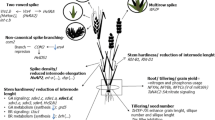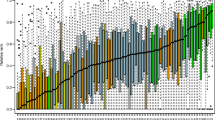Summary
In higher plants, within-species qualitative polymorphism for heat shock proteins (HSPs) is extremely rare, even between genotypes showing different heritable levels of thermotolerance. Here we have explored the amount of quantitative variability in HSP synthesis in maize. We have analyzed the quantitative expression of the typical HSPs in a set of recombinant inbreds (RIs) derived from the f1 hybrid between a thermotolerant (T232)- and a thermosensitive (CM37)-genotype, characterized for about 200 mapped RFLP loci. Significant differences were detected in the level of expression of five HSPs, and their frequency distribution in the RI population is that of a quantitative trait. Subsequent mapping of loci controlling the characters, based on RFLP analysis, confirmed the multigenic control of HSP expression: the regression analysis of the band intensities of each variant HSP on RFLPs revealed, for the different HSPs, a minimum number of three to eight quantitative trait loci (QTLs) accounting for a high proportion (0.35–0.60) of the genetic variability of these bands. An analysis of the correlation between the variability of HSPs and that of cellular membrane stability, a cellular component of thermotolerance, did not reveal any significant association of the two parameters.
Similar content being viewed by others
References
Blum A (1985) Breeding crop varieties for stress environments. Crit Rev Plant Sci 2:199–238
Boyer JS (1982) Plant productivity and environment. Science 218:443–448
Burr B, Burr FA, Thompson KH, Albertson CM, Stuber CW (1988) Gene mapping with recombinant inbreds in maize. Genetics 118:519–526
Chen Q, Lauzon L, DeRocher A, Vierling E (1990) Accumulation, stability and localization of a major chloroplast heat shock protein. J Cell Biol 110:1873–1883
Christiansen MN (1982) World environmental limitations for food and fiber culture. In: Christiansen MN and Lewis CF (eds) Breeding plants for less favourable environments. John Wiley, New York pp 1–11
Duck N, McCormick S, Winter J (1989) Heat shock protein Hsp 70 cognate expression in vegetative and reproductive organs of Lycopersicon esculentum. Proc Natl Acad Sci USA 86:3674–3678
Fender SE, O'Connel MA (1989) Heat shock protein expression in thermotolerant and thermosensitive lines of cotton. Plant Cell Rep 8:37–40
Frova C, Taramino G, Binelli G, Ottaviano E (1988) Heat shock protein variability in maize. Maydica 33:65–76
Frova C, Taramino G, Binelli G (1989) Heat shock proteins during pollen development in maize. Dev Genet 10:324–332
Frova C, Taramino G, Ottaviano E (1991) Sporophytic and gametophytic heat shock proteins in Sorghum bicolor. Plant Sci 73:35–44
Lander ES, Botstein D (1989) Mapping mendelian factors underlying quantitative traits using RFLP linkage maps. Genetics 121:185–199
Levitt J (1980) Responses of plants to environmental stresses. Chilling, freezing and high temperature stresses. Academic Press, New York
Lin CY, Roberts JK, Key JL (1984) Acquisition of thermotolerance in soybean seedlings. Plant Physiol 74:152–160
Mansfield MA, Key JL (1987) Synthesis of low molecular weight heat shock proteins in plants. Plant Physiol 84:1007–1017
Nagao RI, Kimpel JA, Key JL (1990) Molecular and cellular biology of the heat shock response. Adv Genet 28:235–274
Ottaviano E, Sari Gorla M (1988) Selecting cultivars for resistance to high and low temperature. In: Biotechnology in tropical crops improvement. Proceedings of the International Biotechnology Workshop ICRISAT, Hyderabad, India, pp 97–105
Ottaviano E, Sari Gorla M, Pè E, Frova C (1991) Molecular markers (RFLPs and HSPs) for the genetic dissection of thermotolerance in maize. Theor Appl Genet 81:713–719
Pelhalm HRB (1986) Speculations on the functions of the major heat shock and glucose-related proteins. Cell 46:959–961
Pelham HRB (1990) Functions of the HSP70 protein family: an overview. In: Morimoto RI, Tissieres D, Georgopulos C (eds) Stress proteins in biology and medicine. Cold Spring Harbor Laboratory Press, New York, pp 287–299
Ristic Z, Gifford DJ, Cass DD (1991) Heat shock proteins in two lines of Zea mays L that differ in drought and heat resistance. Plant Physiol 97:1430–1434
Roberts JK, Key JL (1991) Isolation and characterization of a soybean HSP70 gene. Plant Mol Biol 16:671–683
Rochester DE, Winter JA, Shah DM (1986) The structure and expression of maize genes encoding the major heat shock protein HSP70. EMBO J 5:451–458
Vierling E (1991) The roles of heat shock proteins in plants. Annu Rev Plant Physiol Plant Mol Biol 42:579–620
Winter J, Wright R, Duck N, Gasser C, Fraley R, Shah D (1988) The inhibition of petunia hsp70 mRNA processing during CdC12 stress. Mol Gen Genet 211:315–319
Wright S, Helentjaris T, Kikuchi Y (1987) RFLP mapping of cloned genes. Maize Genet Coop Newslett 61:89–90
Wu Ch, Caspar T, Browse J, Lindquist S, Sommerville C (1988) Characterization of an HSP70 cognate gene family in Arabidopsis. Plant Physiol 88:731–740
Author information
Authors and Affiliations
Additional information
Communicated by P.L. Pfahler
Rights and permissions
About this article
Cite this article
Frova, C., Gorla, M.S. Quantitative expression of maize HSPs: genetic dissection and association with thermotolerance. Theoret. Appl. Genetics 86, 213–220 (1993). https://doi.org/10.1007/BF00222081
Received:
Accepted:
Issue Date:
DOI: https://doi.org/10.1007/BF00222081




